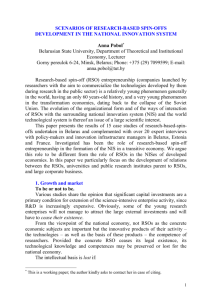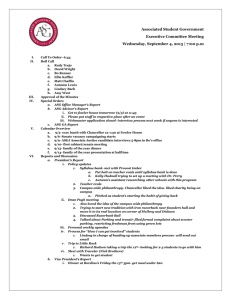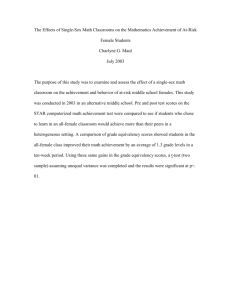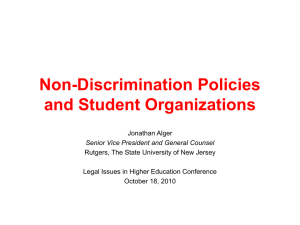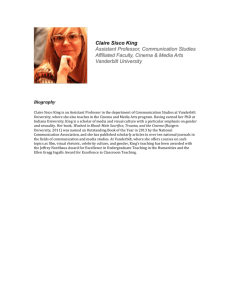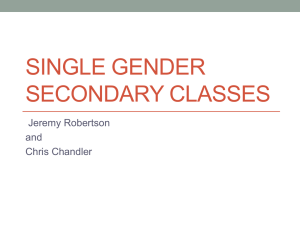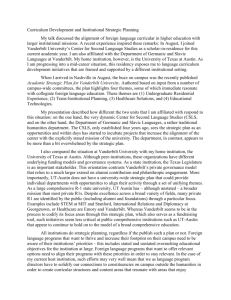Click here - Vanderbilt University
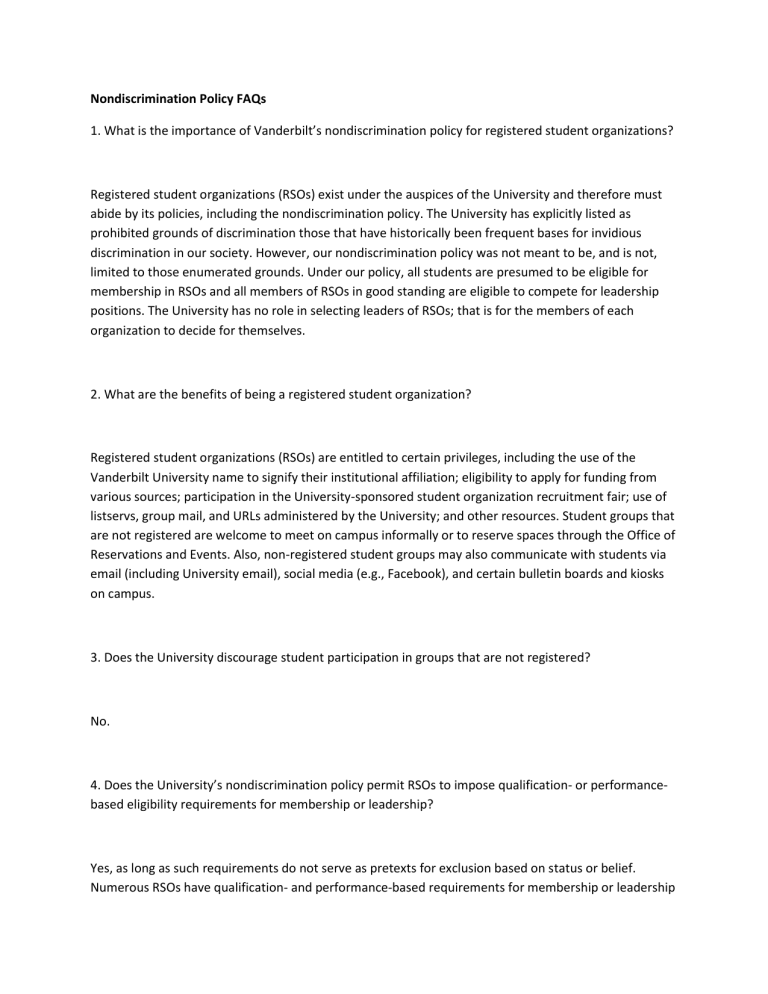
Nondiscrimination Policy FAQs
1. What is the importance of Vanderbilt’s nondiscrimination policy for registered student organizations?
Registered student organizations (RSOs) exist under the auspices of the University and therefore must abide by its policies, including the nondiscrimination policy. The University has explicitly listed as prohibited grounds of discrimination those that have historically been frequent bases for invidious discrimination in our society. However, our nondiscrimination policy was not meant to be, and is not, limited to those enumerated grounds. Under our policy, all students are presumed to be eligible for membership in RSOs and all members of RSOs in good standing are eligible to compete for leadership positions. The University has no role in selecting leaders of RSOs; that is for the members of each organization to decide for themselves.
2. What are the benefits of being a registered student organization?
Registered student organizations (RSOs) are entitled to certain privileges, including the use of the
Vanderbilt University name to signify their institutional affiliation; eligibility to apply for funding from various sources; participation in the University-sponsored student organization recruitment fair; use of listservs, group mail, and URLs administered by the University; and other resources. Student groups that are not registered are welcome to meet on campus informally or to reserve spaces through the Office of
Reservations and Events. Also, non-registered student groups may also communicate with students via email (including University email), social media (e.g., Facebook), and certain bulletin boards and kiosks on campus.
3. Does the University discourage student participation in groups that are not registered?
No.
4. Does the University’s nondiscrimination policy permit RSOs to impose qualification- or performancebased eligibility requirements for membership or leadership?
Yes, as long as such requirements do not serve as pretexts for exclusion based on status or belief.
Numerous RSOs have qualification- and performance-based requirements for membership or leadership
that are fully consistent with University policy. In general, belief-neutral and status-neutral requirements are acceptable. Some examples:
•Singing groups require students to audition.
•Honor societies and others have GPA cutoffs.
•Groups may require members to pay dues.
•Groups may require members to attend meetings regularly.
•Groups may require that only those students who have been in good standing for a specified period of time or who have served on at least one committee are eligible to be officers.
•Groups may have numerical limits to membership as long as membership is open to all students.
5. Does the University’s nondiscrimination policy permit single-sex fraternities and sororities?
Yes. The University’s policy explicitly incorporates and follows Title IX of the Education Amendments Act of 1972, which allows for single-sex social fraternities and sororities.
6. Does the University’s nondiscrimination policy permit single-sex RSOs other than fraternities and sororities?
As noted, the University’s policy incorporates and follows Title IX of the Education Amendments Act of
1972. In addition to fraternities and sororities, Title IX provides for certain other single-sex groups. Title
IX also permits singing groups to establish requirements based on vocal range or quality that may result in single-sex choruses. But such groups must permit all interested students to try out. Single-sex intramural sports teams are allowed pursuant to Title IX where selection for such teams is based upon competitive skill or where the activity involved is a contact sport.
7. Does the University’s nondiscrimination policy permit RSOs to impose belief-based or faith-based requirements for membership or leadership?
No. The policy provides that all Vanderbilt students are eligible for membership in all RSOs. The policy requires that any member in good standing of any RSO must be eligible to compete for any leadership
post in that RSO. For example, Republicans and Independents are eligible to join the College Democrats, and any member may run for office, though it is up to the members to select their leaders. This is true for all RSOs at Vanderbilt.
8. How can an RSO ensure that the organization’s mission and identity are not compromised by students who want to take it over?
Experience at Vanderbilt and other universities shows that students become members and compete for leadership positions in organizations whose missions they support. RSOs are encouraged to articulate what they do and what they stand for clearly so that students can make informed decisions about which organizations to join. RSOs are also permitted to adopt attendance and other neutral requirements designed to distinguish between students who are genuinely interested in an organization’s purposes and those who are not.
9. How can student organizations ensure that they are in compliance with the nondiscrimination policy?
The Dean of Students and staff in the Office of Student Organizations and Governance are available to consult with student organizations, and students hoping to form organizations, about the organization’s purposes, policies, and practices and to answer any questions about the application of the nondiscrimination policy. The Office of Student Organizations and Governance can be reached at studentorganizations@vanderbilt.edu and is located in 207 Sarratt.
10. Does the University have any advice for student organizations formulating their policies for approval by the Office of Student Organizations and Governance?
All submissions to the Office of Student Organizations and Governance should accurately reflect the student organization’s mission, policies, and practices. In order to ensure that prospective members of the organization understand what the organization does and stands for, and what will be expected of them as members and prospective leaders, organizational submissions should make clear the organization’s defining characteristics. While membership and eligibility to compete for leadership positions must be open to all, groups are welcome to emphasize the purposes, policies, and practices that make them distinctive.

